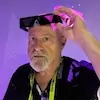
Welcome back to Spatial Beats, where we round up all the top news and happenings from around the spatial computing spectrum, including its escalating infusions with AI and other emerging tech. Let’s dive in…
The Lede
Google’s annual developer conference, Google AI, was focused on AI. The search giant, whose algorithms ruled the past two decades, is facing a future in which the web is a resource, not the answer. They’ve got a lot to lose. Google’s ad revenue in the fourth quarter of 2023 was $65.52 billion, which is 75.9% of the company’s total revenue. Traditional companies die on this hill, defending that kind of revenue. Google seems to be rushing headlong to disrupt itself before others disrupt them. On one hand, they may re-emerge as the master of instant, timely information. On the other hand, the third biggest company in the world might be a trillion-dollar roadkill.
The other major Google IO announcements: Veo, Google’s Answer to OpenAI’s Sora, Augmented Reality Maps and, soon, Android’s answer to the Apple Vision Pro.
Feeling Spatial
Google Street Maps, a great Google Maps Feature, Are Going to Get Bigger. My 2019 book, Convergence, envisioned “a world painted with data.” It’s about damn time, but we’re not anywhere yet. Google’s new efforts will make certain AR experiences discoverable in Google Maps when looking around particular landmarks or cities. If you’re in that place, holding up the Maps app will help make those experiences appear on your phone screen as you hold your phone up over a location – in the future, maybe that will be on glasses, too. A pilot program is starting in Singapore and Paris.
Cannes Film Festival Fully Embraces XR. The prestigious Cannes Film Festival, which began this week, has added extended reality, XR (VR, AR and other variations of spatial computing), as an official category and competition. Cannes was an early supporter of VR, and featured Aljandro Innaratu’s Carne y Arena VR experience in 2017, where it won a special award. Cannes now joins the Venice and Tribeca film festivals and SXSW, which have included XR experiences since 2016.
RayNeo’s TV On Your Face Gets A Controller, Pocket TV. A dedicated controller and cable TV box makes new screen-expanding AR glasses feel even more natural and easy to use.
Killabears Kills it With AR, Part 2. Following its lens campaign, Killabears is out with an interactive AR game that fills players’ space with attacking bears they can shoot down to stay alive and gain points. We break down gameplay and strategic implications.
The AI Desk
OpenAI’s New ChatGPT Chatbot Can Really Chat. People are comparing this incredible new voice feature, which makes ChatGPT-4 sound like Scarlett Johansson. But in the movie “Her,” Johansson doesn’t just sound good to her owner, Joaquim Phoenix, she does good. She does things for this schlumpy, regular guy that only a lover would do. She helps him succeed in his career. She takes care of him. Who wouldn’t want an OS like that? OpenAI thinks you do.
Google’s new video generation tool, Veo, makes videos one minute long from a text prompt, just like Sora. Veo is Google DeepMind’s most capable video generation model to date. It generates high-quality, 1080p resolution videos that can go beyond a minute, in a wide range of cinematic and visual styles. The model is also able to make video clips and extend them to 60 seconds and beyond. It can do this either from a single prompt, or by being given a sequence of prompts which together tell a story. Initially, Veo will be accessible to selected creators through VideoFX, a new experimental tool available on Google’s AI Test Kitchen website. Creators can join a waitlist. Google says it plans to integrate some of Veo’s capabilities into YouTube Shorts and other products in the future.
Weekend Reading
AI’s Her Era Has Arrived. (Kevin Roose/NY Times)
I Am Once Again Asking Our Tech Overlords to Watch the movie “Her.” (Brian Barnett/Wired).
Listen In
For more spatial commentary & insights, check out This Week in XR, hosted by the author of this column, along with Paramount’s Futurist Ted Schilowitz, and Magic Leap founder Rony Abovitz. This week our guests are Matthew Celia and Robert Watts, producers of Eli Roth’s “Haunted House VR Treat” on Meta Quests. You can find it on podcasting platforms Spotify, iTunes, and YouTube.
 Charlie Fink is an author and futurist focused on spatial computing. See his books here. Spatial Beats contains insights and inputs from Fink’s collaborators including Paramount Pictures futurist Ted Shilowitz.
Charlie Fink is an author and futurist focused on spatial computing. See his books here. Spatial Beats contains insights and inputs from Fink’s collaborators including Paramount Pictures futurist Ted Shilowitz.






